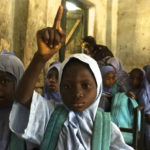Daily Trust on Sunday in this report examines how farming, poverty, religious beliefs and early marriage have put girl child education on the edge in some Oyo State communities.
Like every young lady with ambition, 17-year-old Azeezat (not real name), born into a polygamous family in Kisi community in Irepo LGA of Oyo State, wants to become a nurse to save lives.
But the dream of the final year science student of Novelty Academy, Kisi, is battling storms. Her father, who is a welder and farmer, wants her to get married upon completion of secondary school.
Azeezat’s father, who has nine other children, isn’t a fan of girl child education, hence he is not ready to fund her education beyond SSCE.
- Why Obasanjo, Yar’Adua, Jonathan, Buhari Could Not Fix Power Sector Crisis – Ex-TCN MD
- Is Bello the new Prince of the Niger?
She told our correspondent that, “He has not told me directly, but my mum is aware. His attitude towards girl child education is negative and I feel bad because he wants to kill my goal.”
She noted that apart from her father’s negative attitude to girl child education he’s being influenced by his peers.
She said, “My father and his friends usually discuss under the mango tree that female students usually misbehave while on campus.”
The young girl, however, seems undeterred, saying, “I will work hard to further my studies since I have the knowledge of tailoring.”
Azeezat is not alone in such a situation, as thousands of girls in the community have had their dreams cut short due to their fathers’ indisposition to girl child education. To the men, investment in girl child education “is a waste as she will end up in her husband’s house.”
A mother of two in Kisi, Raimot Ahmad, told our correspondent that, “In the olden days in Kisi, the majority of families did not enroll their daughters in school. They did not see any value for it.
“But things are now changing, every family now sees pride in girl child education. Although, there are still exceptions. Some Islamic sects like Mokondoros still don’t enroll their female wards in school. They don’t believe in Western education.”
In October, 2019, during the first celebration of the International Day of the Girl Child under Governor Seyi Makinde’s watch, the Secretary to the Government of Oyo State (SSG), Mrs Olubamiwo Adeosun, harped on the government’s commitment to girl child education “because education is one of the pillars of the administration.
“When we say that education is one of the pillars of this administration, it is very clear because education sure makes a complete difference in the lives of people, even the generations to come. And we know that if we want to make our difference in the history of Oyo State, then education is key.
“You also know that when we talk about the number of girl children, it is almost equal if not more than that of the boys, so if you do not invest in the girl children you are missing out on so much value on the children.”
She added that, “But we should not just let the celebration of the girl child end with the international day celebration; let us continue to invest in the girl child so that these children we are seeing here today will become leaders of tomorrow, and not just leaders, but good leaders, because we have invested in them all.”
In December, 2020, the National Education Data Survey (NEDS) conducted by the National Population Commission (NPC) revealed that 12 per cent of children of school age in Oyo State were still out-of-school. The data captured both male and female children.
But despite the staggering data, the state government boasted that it had been able to bring 40,000 children back to school.
However, UNICEF’s 2021 Multiple Indicator Cluster Survey (MICS-6) indicated that 16.3 per cent of female children were out of senior and junior secondary schools in Oyo State. Also, 14.9 per cent of the population (three years and above) of both male and female had never attended formal education in the state.
Findings by Daily Trust on Sunday revealed that poverty, pregnancy, child labour, child marriage and religious beliefs are some of the factors militating against girl child education in Kisi and other parts of Oyo State.
Child marriage, CGB
Sections 23 and 24 of the Child Rights Law of Oyo State prohibits child marriage and betrothal. Under the law, a child is said to be a person under 18 years and as such “is incapable of contracting a valid marriage.”
Yet, child marriage, which is rampant in many Oyo State communities, has had adverse effects on girl child education, findings by Daily Trust on Sunday have shown.
UNICEF’s 2021 MICS-6 revealed that 3.4 per cent of girls married before 15 years, while 13.2 per cent married before 18 years in Oyo State.
Apart from child marriage, girls in the state also suffer human rights violation like rape and Female Genital Mutilation (FGM). In Oyo, 43.2 per cent of women underwent one form of FGM or the other, the UNICEF report indicated.
Farming
In Ogbomosho and some of its adjoining communities, farming activities are dealing huge blows on girl child education.
With major focus on cashew, groundnut and tomato, Iresa-Adu, Iresa-Apa, Onikeke, Fasina, Gbena, Baasa, among other communities in Surulere LGA of the state, are homes to commercial farmers. The council was part of the former Ogbomoso LGA.
A teacher in one of the public secondary schools in Ogbomoso told Daily Trust on Sunday that students were always engaged in work on farms, picking cashew or working as labourers in cashew warehouses. This, the teacher said, affected education adversely in the area.
He said, “During the last WAEC registration, we needed to go to the houses of some students who had stopped coming to school to plead with them to come and register.
“We discovered that two of the girls were pregnant and that was why they stopped coming to school, but we still registered them.
“Things like these are very common in schools in Ogbomoso. But there are a lot of factors responsible for them.
“One of the reasons is poverty. From our interactions with students, we have discovered that some of them are the ones fending for themselves. They engage in menial jobs to take care of themselves, and this is a big distraction for their education.
In Arulogun Oja town, Ibadan, the Baale, Chief Lawal Taofik Arulogun told Daily Trust on Sunday that some parents were in the habit of engaging their daughters in hawking and farming to the detriment of their education.
He said, “Some parents don’t believe in educating their girl children as they see it as a waste of resources.”
He added that, “Government should do more door-to-door campaigns on the importance of educating a girl child. If they can do it when campaigning for elections, then nothing stops them from doing it when they are in office.”
Let’s adopt carrot & stick approach – Advocate
An advocate of girl child education and Chief Responsibility Officer at Natineee Empowerment for Sustainable Initiative (NESII), Ms Enitan Sophie Oluwa, identified “lack of resources exacerbated by poverty and patriarchal values” as one of the factors militating the education of girls.
She said, “Stigma is another great factor militating against girl child education. I mean a society heavy on religion, culture and other factors that make a girl child get discriminated against and seen as less important. Many girls are being denied access to schooling and education on the grounds of being female and seen as the gender that would be married off which makes the investment without returns.
“Societal expectation from the girl child based on her biological functions tends to dictate a lot as regards the kind of educational empowerment a girl child would get.”
She submitted that, “Girl child education hasn’t totally gotten the attention it needs, but over the years more energy has been put there and many more efforts would yield results in coming years.
“I believe in the carrot and stick method where people are enlightened and encouraged to send their daughters to school. With the many government policies neatly carved on paper with little action in reality.
“One of the radical ways for me is encouraging people to have only the number of children they can cater for. Enforcing laws when they get violated will also send a strong signal to other people on how serious the government is.
“When we say girl child education is threatened, I think we need to imagine the fate of girls with disabilities. This feels like double jeopardy, and I know we have to act fast to ensure every child regardless of their disability status gets the education they require to live a fulfilling life.”
Islam prioritises girl child education – Cleric
An Ilorin-based Islamic scholar, Sambo Fatiu, told Daily Trust on Sunday that, “In Islam, the education of the girl child is treated with utmost importance, and Islam makes provision for the rights of women; whether as a girl child, wife, sister or mother.”
He cited examples of Maryam Aloma Muktar, a former Chief Justice of Nigeria (CJN); and Zainab Ahmed, the current Minister of finance: as good examples of female Northerners who got Western education.
The Islamic scholar also admitted that some Muslims “still refuse their girl child access to basic education, but it is very minimal.
“As for South West Nigeria, it is true that we have some Muslims who still refuse their girl child access to basic education, but it is very minimal. The reason for this is not far-fetched. It is as a result of the bias from some quarters who deny our girls the right to use their hijab. This was common in all states in the South West until recently when the Supreme Court affirmed that the girl child has a right to her hijab; whether in school or at home.”
Govt mum
Several efforts to get comments from officials of the state government proved abortive as for three days, the Commissioner for Education, Science and Technology, Abdulrahman Abdulraheem, could not be reached via his mobile phone.
Also, the Chairman of SUBEB, Dr Nureni Adeniran, did not pick calls put across to his mobile phone and failed to respond to an SMS.

 Join Daily Trust WhatsApp Community For Quick Access To News and Happenings Around You.
Join Daily Trust WhatsApp Community For Quick Access To News and Happenings Around You.


